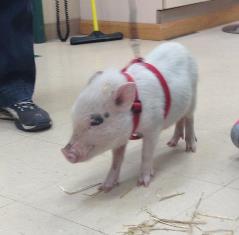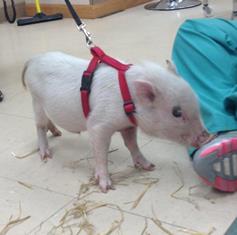Potbellied pigs make wonderful pets for the right family who are able to provide the proper care and housing requirements. Your new pig will be a member of your household for up to fifteen years. Therefore, you certainly want to have done your research. You also want to make a wise choice when approaching a breeder or sanctuary
Look for a pig that is registered, vaccinated, socialized and properly cared for. Finding a reputable breeder/ sanctuary will be worth the time investment in your new pet.
Following are a few things you need to know before you bring a potbellied pig home:
Pigs require proper housing.
Pigs are highly intelligent and can become bored very easily which might lead to destructive behavior indoors. It’s also important to note that potbellied pigs can become aggressive if kept inside the home full time.
Even though they can be litter box trained, your pig must have access to an outside area at all times to stay happy and non-aggressive. They also do well with the companionship of at least one other pig. Please be sure to supervise small children and other pets around your pig(s).
Your pig can be crated at night, and they must be kept warm. You can provide a heat lamp or jacket for your pig. Clean straw makes a comfortable bedding as well as fleece blankets.
Feeding guidelines to follow:
You can purchase commercial pig food that is nutritionally balanced. Babies should be fed a starter feed initially. At about 2 ½-3 months of age, switch to a maintenance diet that will contain a higher percentage of protein.
Remember, a pig can bite accidentally. Stay safe and do not try to feed by hand. It’s best to place the food on the ground or in a bowl. Provide access to fresh water at all times.
It’s recommended you feed your pig 1/4-1/2 cup of food twice daily. Just like other types of pets and people, pig obesity can lead to future health problems. Please monitor your pig’s food intake, and limit fruits and vegetables that will cause you pet to gain unnecessary weight.
Pigs gain weight quickly, and a healthy pig will be half of his adult weight in only one year’s time.

Hamlet, a Pot Bellied Pig patient at Belle Mead Animal Hospital
You also may not want to use treats or food as rewards because your pig will be motivated by this and associate people and attention with getting food.
Veterinary care is essential.
Pigs can be hardy animals, but they do require regular veterinary care. Pigs should receive yearly vaccinations, yearly hoof trimmings, and a yearly physical.
Spaying / neutering at the proper age is essential to ensure a sweet-natured pet.
Talk to your veterinarian about a proper vaccination schedule for your pig. There are several vaccinations highly recommended for outdoor pigs which include:
- Rabies shot
- Erysipelas (caused by a bacterium found in the ground), Bordatella, and Pasturella (3 in 1 vaccine)
- Tetanus
Worming twice a year in the spring and fall is another essential for your pig. Discuss with your vet the proper procedure.
Please contact our office if you have further questions or would like to schedule an appointment.
Dr. Joe Martins, DVM, Belle Mead Animal Hospital

Dr Joe Martins, DVM, Belle Mead Animal Hospital



